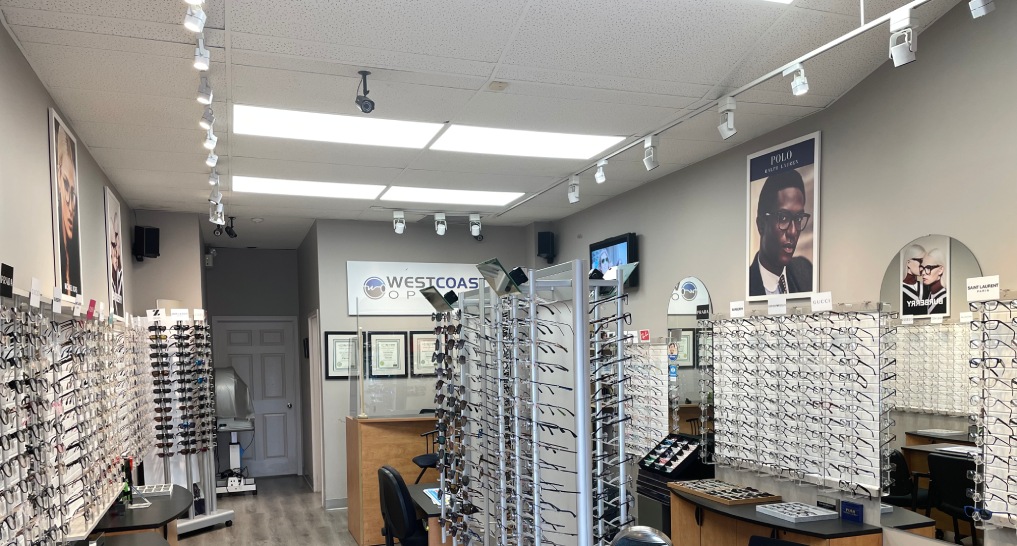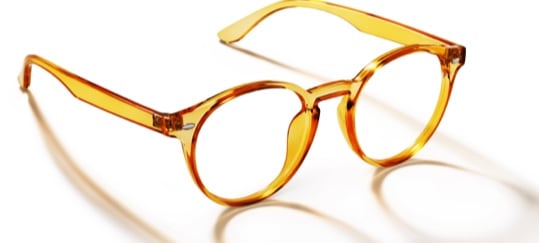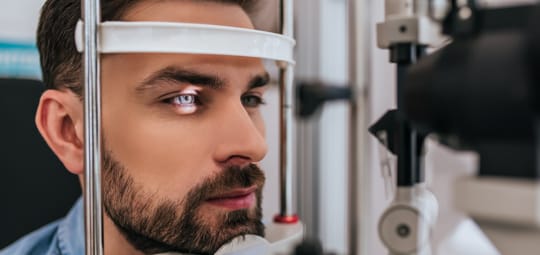

Comprehensive Eye Exams: Your Key to Healthy Vision
West Coast Optical is your destination for comprehensive eye exams for the whole family. We have built a legacy of high-quality eye care in the lower mainland. Multiple generations have trusted us with their family’s eye care needs — we’ve been your trusted eye doctor in Surrey, Langley, White Rock, and beyond for 34 years!
Our focus is your vision, and we delight in bringing you our expertise. Our experienced team includes licenced opticians, contact lens specialists, an eyewear stylist, and an optometrist. We use cutting-edge technology and a warm personal touch so you can be assured every aspect of your vision is taken care of.
Our mission is simple — to offer you unparalleled service.
Fashion Forward Frames & Experienced Opticians
With high-end frame brands like Ray-Ban, Oakley, Tiffany and Prada, along with our cutting-edge lenses, you’ll leave with sharp uncompromised vision and an abundance of fashion style.
Our team of licensed opticians is here to help find and fit the right pair of frames and lenses to you and your lifestyle. Visit us today!

Come See Us
Find us right on the Fraser Highway near the Langley/Surrey border, one block from Willowbrook Shopping Centre in Langley!

Our Address
- 102B 19475 Fraser Hwy
- Surrey, BC V3S 6K7
Contact Information
- Phone: 604.533.1171
- Toll-Free: 1-877-583-9233
- Email: [email protected]
Our Winter Hours
- Monday: 9:30 AM – 5:30 PM
- Tuesday: 9:30 AM – 5:30 PM
- Wednesday: 9:30 AM – 5:30 PM
- Thursday: 9:30 AM – 6:30 PM
- Friday: 9:30 AM – 5:30 PM
- Saturday: 9:30 AM – 5:00 PM
- Sunday: Closed

Our Brands








Our Google Reviews
Our Blog
Are Polarized Sunglasses Better For Your Eyes?
EyewearSunglassesPolarized sunglasses have gained popularity in recent years, with many claiming that they are better for your eyes than regular sunglasses. Polarized sunglasses have a special filter that blocks horizontal light waves, reducing glare and improving vision. Polarized sunglasses can improve visual clarity and comfort by filtering out harsh glare and reflections to reduce eye […]
How to Unclog Meibomian Glands
Dry EyeIf you’ve ever felt that burning and gritty sensation in the eyes, it might be dry eye disease. It’s an extremely common eye condition that can come with a range of symptoms from blurry vision to light sensitivity and extreme discomfort. Dry eye disease often develops due to a clog in the meibomian glands, leading […]
What to Expect at a Pediatric Eye Exam
Eye ExamsYour child’s eyes are precious, and as a parent, it’s always a good idea to take steps to preserve their vision. But you don’t have to do it alone—your optometrist can help! Regular children’s eye exams are an excellent way to help take care of your child’s eyes and vision. But what should you and […]
Are Polarized Sunglasses Better For Your Eyes?

Polarized sunglasses have gained popularity in recent years, with many claiming that they are better for your eyes than regular sunglasses. Polarized sunglasses have a special filter that blocks horizontal light waves, reducing glare and improving vision. Polarized sunglasses can improve visual clarity and comfort by filtering out harsh glare and reflections to reduce eye […]
How to Unclog Meibomian Glands

If you’ve ever felt that burning and gritty sensation in the eyes, it might be dry eye disease. It’s an extremely common eye condition that can come with a range of symptoms from blurry vision to light sensitivity and extreme discomfort. Dry eye disease often develops due to a clog in the meibomian glands, leading […]
What to Expect at a Pediatric Eye Exam

Your child’s eyes are precious, and as a parent, it’s always a good idea to take steps to preserve their vision. But you don’t have to do it alone—your optometrist can help! Regular children’s eye exams are an excellent way to help take care of your child’s eyes and vision. But what should you and […]








